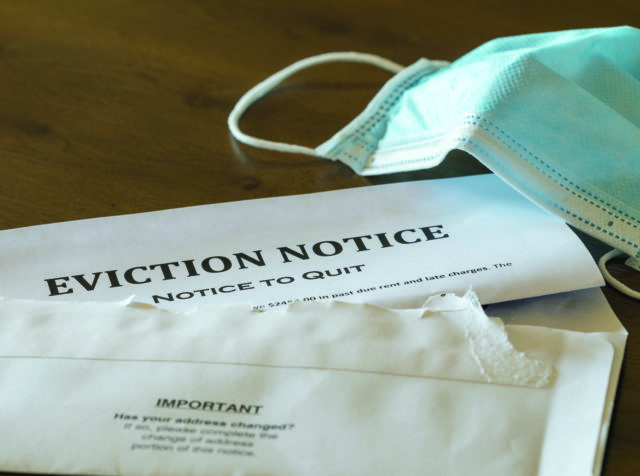
A year after program launch, City releases first report on Eviction Prevention and Rental Assistance Services
After voters passed the No Eviction Without Representation (NEWR) measure in November 2020 (59%-41%), the City of Boulder launched in January 2021 the Eviction Prevention and Rental Assistance Services (EPRAS) program to provide legal, financial and educational support to community members facing potential evictions.
Funded via an excise tax that landlords now pay on each property they operate with a rental license, EPRAS is designed to minimize or avoid the traumas associated with eviction and help people stay housed—the most effective way for a community to prevent and reduce rates of homelessness, according to the National Coalition for the Homeless.
A Feb. 7 report summarizes the program’s first year of work.
In short, the number of eviction filings in Boulder’s courthouse in 2020 and 2021 (392 and 557, respectively) were far lower than the 1,000 it saw on average in years prior. This reduction, however, is likely due to the temporary, pandemic-induced eviction moratoriums and financial support provided by state and federal governments. The report shows eviction filings began increasing once protections and provisions expired “and are now in line with pre-pandemic levels,” it states. “As we enter 2022, we expect a return to typical rates of eviction.”
EPRAS’ biggest successes of the year might lie in having grown its visibility across the community and continuing to flesh-out the program’s multiple service facets. The five-member Tenant Advisory Committee was seated and began quarterly meetings, according to the report, and 390 tenants contacted EPRAS to access services before or at court. When observing eviction proceedings in court, an EPRAS team was able to reach 68 tenants on the eviction docket and connect them with services. Since July 2021, $168,536 in rental assistance has been distributed to 82 households.
Looking ahead, EPRAS’ goals include streamlining intake forms, implementing follow-up surveys, and compiling and publishing more outcome data.
Eco-Cycle welcomes the nation’s first electric compost truck
It’s a Mack LR Electric—a boxy cab with a giant windshield joined to its large compost-collecting receptacle in the back—and it runs on four fast-charging lithium-ion batteries that produce neither exhaust emissions nor noise. When you see the collection truck quietly rolling from street to street, picking up and emptying compost recepticles across Boulder County, say hello to the U.S.’s first electric compost truck.
“This is the start of something very special,” Gov. Jared Polis said at the Feb. 10 press conference Eco-Cycle hosted to introduce the new truck, which will join Eco-Cyce’s fleet of compost collectors in Boulder County this summer.
According to the County, about 20% of its waste stream is plant trimmings and fruit and vegetable scraps, which can be recycled as compost. As a natural process of decomposition, composting creates high-quality soil amendments and reduces pressure on our landfills by diverting organic materials elsewhere.
In the early 2000s, Boulder and Eco-Cycle collaborated to become one of the U.S.’s first municipalities to provide residential communities with curbside recycling services. “It’s only fitting Eco-Cycle would bring us yet another first,” City of Boulder Mayor Aaron Brockett said to the crowd.
“Moving people and things is our planet’s fast-growing energy-based source of greenhouse gas (GHG) emissions,” Mayor Brockett said. “So every single conversion like this helps in Boulder’s and the broad progress toward our aggressive clean energy and climate goals.”
As of October 2021, the city’s goals are to reduce GHG emissions 70% by 2030 against a 2018 baseline; become a net-zero city by 2035; and become a carbon-positive city by 2040.
In 2019, transportation had overtaken all other sources as the City’s largest contributor to GHG emissions, then accounting for about 41% of the city’s gaseous output. But in 2020, when the pandemic kept people at home and induced lockdowns, transportation emissions drastically fell from 718,452 metric tons of carbon dioxide, equivalent to 451,104 metric tons—or 22% emissions reduction against the newly set 2018 baseline.
“While this reduction appears to convey significant progress towards the city’s climate targets, the results for the year 2020 should be taken within the context that this was an extraordinary year and may not reflect persistent progress towards the city’s goals,” the City’s Community GHG Dashboard states.
Moving to electrify commercial fleets and continue reducing transportations’ contributions to GHG emissions “aligns deeply with the City of Boulder’s mission, vision and climate goals,” Mayor Brockett said.
The electrification of vehicles is also a major component of Gov. Polis’ plan to drastically cut GHG pollution across all of Colorado, as transportation recently became the state’s largest source of GHG emissions, too, according to the Colorado Energy Office’s 2021 “Greenhouse Gas Pollution Reduction Roadmap.” The state’s emission-reduction goals are set against a 2005 baseline: 26% by 2025, 50% by 2030 and 90% by 2050.
Late last year, Polis included monies to electrify the state’s fleet of school buses in his $40 billion state budget proposal, which the General Assembly’s Joint Budget Committee will hear and vote on this spring.
“Colorado has long been a national leader in reducing emissions,” Gov. Polis said to a clapping Boulder County crowd, yet acknowledged more work is needed: “The clock is ticking.”














